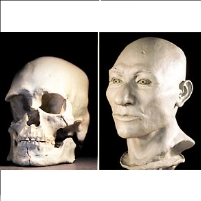Native Remains Nationwide to be Returned from Museums to Tribes
Monday, March 29, 2010
 Kennewick Man
Kennewick Man
The Department of the Interior has decided to turn over to Indian tribes and Native Hawaiians the human remains and artifacts currently in possession of museums and natural history collections. Taking effect May 14, the decision includes remains that cannot be traced to a particular tribe or organization. These remains will be given to tribes that had a proven presence on the land from which the remains were taken.
Interior Department officials also announced they are streamlining the process by which it returns remains and artifacts. Previously, the Secretary of the Interior relied on a special review committee to decide how to process requests from tribes. That committee has now been eliminated.
The changes are part of the Native American Graves Protection and Repatriation Act of 1990, which requires all museums and federal agencies to identify Indian cultural items in their collections. As of last year, the remains of almost 40,000 people have been registered.
In response to the Interior Department rule changes, the University of Michigan said it will return the remains of nearly 1,400 Indians, some of them more than 3,000 years old, to various tribes.
It is still unclear what will become of Kennewick Man, a 9,000-year-old skeleton that was found on the Columbia River in Washington State in 1996. The remains were the subject of a lawsuit, settled in by the Ninth Circuit Court of Appeals in 2004, that denied local tribes ownership because it could not be proven that Kennewick Man belonged to a tribe.
-Noel Brinkerhoff, David Wallechinsky
Native Remains Will Be Repatriated (Courthouse News Service)
Native American Graves Protection and Repatriation Act Regulations--Disposition of Culturally Unidentifiable Human Remains; Final Rule (Department of the Interior)
National NAGPRA (National Park Service)
University of Michigan Begins Process of Returning Native American Remains to Tribes (by Juliana Keeping, Ann Arbor.com)
Kennewick Man Virtual Interpretive Center (Tri-City Herald)
- Top Stories
- Unusual News
- Where is the Money Going?
- Controversies
- U.S. and the World
- Appointments and Resignations
- Latest News
- Musk and Trump Fire Members of Congress
- Trump Calls for Violent Street Demonstrations Against Himself
- Trump Changes Name of Republican Party
- The 2024 Election By the Numbers
- Bashar al-Assad—The Fall of a Rabid AntiSemite






Comments